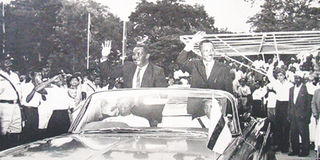The Union of Tanganyika and Zanzibar and our past

President Julius Nyerere and his Zanzibar counterpart Abeid Amani Karume wave to the people from an open car during celebrations of the Union of Tanganyika and Zanzibar.
PHOTO |FILE
What you need to know:
One Ali Msham and a group of men holding axes, and an arrow who were described as Bantu Group-a militia which provided security for TANU leaders. The photo was said to have been taken in the mid-1950s.
About a month ago, an old photo circulated online. The explanation given on the identities of those on that photo was John Rupia, Mwalimu and Zuberi Mtemvu; all seated.
One Ali Msham and a group of men holding axes, and an arrow who were described as Bantu Group-a militia which provided security for TANU leaders. The photo was said to have been taken in the mid-1950s.
Out of curiosity I passed around that photo asking people if they could identify more than one person on it which most did not. One may say that it is unfair to make conclusions based on a single, old photo but it is the same thing with some of the famous names in our country but somehow if you ask around as to why that person is famous or what they accomplished to deserve the honours society accorded them, don’t be surprised if no one knows anything about them.
As we are about to celebrate 53 years of the Union between Tanganyika and Zanzibar, we continue to drift far from our past to the point such celebrations have come to be more of a habit than serving the purpose of reminding us of who we are as a country and who sacrificed and worked hard to bequeath us the country we have today.
These national celebrations have followed the same script for so many years. It is easier to remember which season Simba or Yanga won the Premier League or Diamond dropped this or that song than remembering last year’s theme for any of the key national celebrations.
How did we end up here?
We can lay all the blame on politicians for this state of affairs; that they stopped worrying about governing and turned to themselves, to fulfil their own personal ambitions at our expense. That there are many sections of our society and some remote parts of the country where the state long disappeared to who knows where. That people have other more pressing matters than worry about a distant past irrelevant to their current predicaments.
There are those who will blame globalization and its impacts especially on the youths who have embraced modernity while discarding whatever national values we held in the past. A peculiar outcome as in other parts of the world, globalization has triggered society consciousness, which has led to varied outcomes ranging from becoming inward looking to racists.
National events are intended to be a show of nationalism; to renew our sense in the never ending state building project. That is not our experience in recent years. The script we have followed of military games, colourful parades, traditional dances and modern music, a speech here and there, have done nothing to instil a sense of nationalism and pride among the youths.
These activities do not reconnect them with their past. They do not help them understand why we are where we are. For a country whose largest portion of the population consist of young people who are restless, giving them a sense of purpose with their life and providing them with an identity they can hold onto should be the goal of such national events.
How our past is taught in schools should be improved. There has to be continued efforts through the media to sensitize and educate the people of their past; reconnect them with their roots. These celebrations have to be inclusive. This “more of a here and now” type lifestyle is sowing the seeds for our own demise in the future.
Even though history belongs to the victors, one cannot speak of the victors without the villains and the forces which shaped their choices and their roles. The celebrations have to rotate countrywide so as to bring them close to the people, else they remain to be television affairs.
One wonders of the future of the Union when the day comes we vote for a different political party to lead us. The lingering questions and forces pulling in different directions about the Union no doubt include the issue of our identity, and we have not fully addressed this matter. The past will be a good place to start looking for the answers.
Part of this year’s Union celebration theme urges people to “protect and strengthen” (the Union); but it is a mistake to ask anyone to protect and strengthen what they do not understand.
Happy Birthday beloved Motherland Tanzania!




